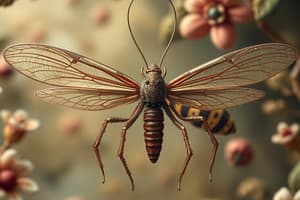Podcast
Questions and Answers
What defines anthropozoonosis?
What defines anthropozoonosis?
- Diseases that can only be spread through soil and water
- Infections transmitted from humans to humans only
- Zoonosis maintained in nature by animals and transmissible to humans (correct)
- Parasitic infections naturally maintained by humans
Which type of parasite establishes itself in an unusual host?
Which type of parasite establishes itself in an unusual host?
- Facultative parasite
- Incidental parasite (correct)
- Specific parasite
- Temporary parasite
Which of the following describes a reservoir host?
Which of the following describes a reservoir host?
- A host that can be infected but does not transmit the infection (correct)
- A host that is only temporarily affected by the parasite
- A host that supports the reproduction of parasites
- A primary host responsible for passing on infectious agents
What is an example of a method through which infections can be transmitted?
What is an example of a method through which infections can be transmitted?
In terms of source of infection, what is true about zooanthroponosis?
In terms of source of infection, what is true about zooanthroponosis?
What distinguishes a parasite from an organism that lives independently of a host?
What distinguishes a parasite from an organism that lives independently of a host?
Which term refers to parasites that live outside the body of their host?
Which term refers to parasites that live outside the body of their host?
What role does a definitive host play in the lifecycle of a parasite?
What role does a definitive host play in the lifecycle of a parasite?
What is a common characteristic of zoonotic diseases?
What is a common characteristic of zoonotic diseases?
What does the term 'commensalism' refer to in ecological interactions?
What does the term 'commensalism' refer to in ecological interactions?
What defines an arthropod as a paratentic host?
What defines an arthropod as a paratentic host?
Which of the following best describes the term 'phoresy'?
Which of the following best describes the term 'phoresy'?
Which situation describes an unusual host for a parasite?
Which situation describes an unusual host for a parasite?
Which statement correctly defines zooanthroponosis?
Which statement correctly defines zooanthroponosis?
Which of the following correctly describes a reservoir host?
Which of the following correctly describes a reservoir host?
Which transmission method is associated with zoonotic infections?
Which transmission method is associated with zoonotic infections?
What describes a specific parasite in the context of unusual hosts?
What describes a specific parasite in the context of unusual hosts?
How is infection most commonly transmitted through environmental sites?
How is infection most commonly transmitted through environmental sites?
What is the primary role of a definitive host in the life cycle of a parasite?
What is the primary role of a definitive host in the life cycle of a parasite?
Which type of host is NOT critical for the development cycle of a parasite?
Which type of host is NOT critical for the development cycle of a parasite?
What distinguishes a true parasite from an organism that is occasionally parasitic?
What distinguishes a true parasite from an organism that is occasionally parasitic?
What type of relationship exists between a parasitic organism and its host?
What type of relationship exists between a parasitic organism and its host?
How do ectoparasites primarily interact with their hosts?
How do ectoparasites primarily interact with their hosts?
Which of the following statements accurately characterizes zoonotic diseases?
Which of the following statements accurately characterizes zoonotic diseases?
What role does an arthropod play in the transmission of parasites?
What role does an arthropod play in the transmission of parasites?
What is the primary characteristic of a reservoir host?
What is the primary characteristic of a reservoir host?
Flashcards
Anthropozoonosis
Anthropozoonosis
A type of zoonosis where the disease is maintained in nature by animals and can be transmitted to humans.
Zooanthroponosis
Zooanthroponosis
A parasitic infection naturally maintained in humans but can be transmitted to other vertebrates.
Specific parasite
Specific parasite
A parasite that infects its usual host, as it's expected.
Incidental parasite
Incidental parasite
Signup and view all the flashcards
Reservoir host
Reservoir host
Signup and view all the flashcards
Parasitology
Parasitology
Signup and view all the flashcards
Parasite
Parasite
Signup and view all the flashcards
Host
Host
Signup and view all the flashcards
Definitive Host
Definitive Host
Signup and view all the flashcards
Intermediate Host
Intermediate Host
Signup and view all the flashcards
Zoonosis
Zoonosis
Signup and view all the flashcards
Commensalism
Commensalism
Signup and view all the flashcards
Mutualism
Mutualism
Signup and view all the flashcards
Facultative parasite
Facultative parasite
Signup and view all the flashcards
Temporary parasite
Temporary parasite
Signup and view all the flashcards
End host
End host
Signup and view all the flashcards
Infestation vs. Infection
Infestation vs. Infection
Signup and view all the flashcards
What is a Definitive Host?
What is a Definitive Host?
Signup and view all the flashcards
What is an Intermediate Host?
What is an Intermediate Host?
Signup and view all the flashcards
What is a Reservoir Host?
What is a Reservoir Host?
Signup and view all the flashcards
What is a Dead-End Host?
What is a Dead-End Host?
Signup and view all the flashcards
What is Commensalism?
What is Commensalism?
Signup and view all the flashcards
What is Mutualism?
What is Mutualism?
Signup and view all the flashcards
Study Notes
Parasitology - General Concepts
- Parasitology is the study of parasites affecting humans
- A parasite is an organism that lives in or on another organism (host) and gets its food from or at the expense of its host.
- The host is the organism in or on which the parasite lives.
Types of Parasites
- Obligatory parasites: Cannot complete their life cycle without a suitable host.
- Facultative parasites: Can live independently of a host but may occasionally be parasitic under certain conditions.
- Ectoparasites: Live outside the host (infestation).
- Endoparasites: Live inside the host (infection).
- Accidental (incidental) parasites: Attack or establish themselves in unusual hosts they don't normally parasitize.
- Temporary parasites: Feed on and leave the host (e.g., biting insects).
- Specific parasites: Affect specific host species.
- Coprozoic (spurious) parasites: Pass through the digestive tract without infecting the host.
Types of Hosts
- Definitive host: The host where the parasite reaches its mature form and is capable of reproduction.
- Intermediate host: Harbors non-sexual (or sexually immature) phases of the parasite, often sites of asexual reproduction.
- Reservoir host: An animal that harbors the parasite and acts as a continuous source of infection.
- Paratenic (transport) host: A host that harbors the parasite but isn't necessary for its life cycle; the parasite doesn't develop in this host.
- Blind-end host: A host from which infectious agents are not transmitted to other susceptible hosts.
- Vector: An arthropod that harbors parasitic stages and transmits them to another host.
Parasite Transmission
- Some parasites require multiple hosts
- Parasites can transmit directly or indirectly by different methods
- Infection can occur through direct physical contact, vectors, or through ingestion of contaminated food or water.
Host-Parasite Interactions
- Parasitism: One organism benefits at the expense of the other.
- Commensalism: One organism benefits without harming the other.
- Mutualism: Both organisms benefit.
- Phoresis: One organism uses another for transport. This can be seen in external interactions like an organism riding on another for transport or a parasite riding on its host.
Zoonoses
- Zoonoses are infectious diseases transmitted from animals to humans.
- Anthropozoonoses: Zoonoses maintained in nature by animals and are transmissible to humans.
- Zooanthroponoses: Parasitic infections naturally maintained by humans but can be transmitted to other vertebrates.
- Anthroponoses: Diseases transmissible from humans to humans.
- Zoonotic diseases are classified according to the source of infection (wild/domestic animals) and the method of infection (direct, metazoonosis, saprozoonosis).
Classification of Parasites
- Protozoa: Unicellular parasites (e.g., malaria parasites, amoebas). These are endoparasites.
- Helminths/Helminthia: Multicellular parasites (e.g., tapeworms, flukes, nematodes). These are endoparasites.
- Arthropods: An important group of parasites are Ectoparasites (e.g., ticks, mites, lice).
Parasite Life Cycles and Transmission
- Parasites have complex life cycles with multiple stages in different hosts. Transmission mechanisms vary based on the parasite specifics.
Questions
- Question 1: Parasites that attack or establish themselves in unusual hosts are called incidental parasites.
- Question 2: A host from which infectious agents are not transmitted to other susceptible hosts is called a blind-end (or dead-end) host.
Studying That Suits You
Use AI to generate personalized quizzes and flashcards to suit your learning preferences.




